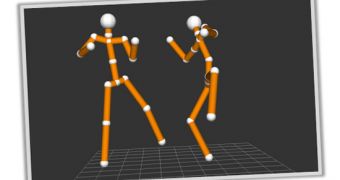While the Microsoft Kinect is, without a doubt, the most popular motion controller out there, it's by no means the only one, especially since a company called SoftKinectic has developed a 3D gesture recognition platform based on Linux a lot earlier, but didn't really manage to push it onto the market, due to financial constraints.
Without a doubt, Microsoft's Kinect motion controller has been one of the most pleasant surprises that shook up the world of technology over the last quarter of 2010, the device (or better said, its hacked version) managing to deliver a huge array of possibilities and applications, a lot more than Microsoft had originally imagined.
However, it seems that the people over SoftKinectic had developed a similar solution, featuring a middleware platform called iisu, accompanied by an open-API Kinect competitor including a 3D chipset, image sensors/cameras and set-top-boxes.
Plus, as HotHardware reports, through a partnership with Optrima Electronics, iisu has been married to 3D image sensing hardware that is available to system makers now.
Optrima's DepthSense chipset handles the 3D computations for devices such as Optrima's OptriCam family of 3D imagers, while iisu also supports other 3D gesture cameras, such as Panasonic’s time-of-flight 3D image sensor.
Compatible with Adobe Flash, Unity 3D and 3DVIA Virtools development environments, iisu's uses include video game projects as well as many other non-gaming markets including fitness, senior rehabilitation and e-learning.
The versatile nature and openness of iisu makes it very compelling for developers interested in multi-platform compatibility (e.g. PC, console, set-top boxes) that allows apps to be released on Windows or Linux.
Plus, the iisu SDK is compatible with most 3D cameras on the market, regardless of the type of underlying technology (structured light, time of flight and stereoscopic).
Of course, it remains to be seen just how iisu and SoftKinectic will manage to fare against Microsoft's Kinect, but since this platform embraces the open-source environment and communities, rather than proving completely non-supportive (as is the case with Microsoft), they might actually have a shot (a long one, but a shot nonetheless).

 14 DAY TRIAL //
14 DAY TRIAL //